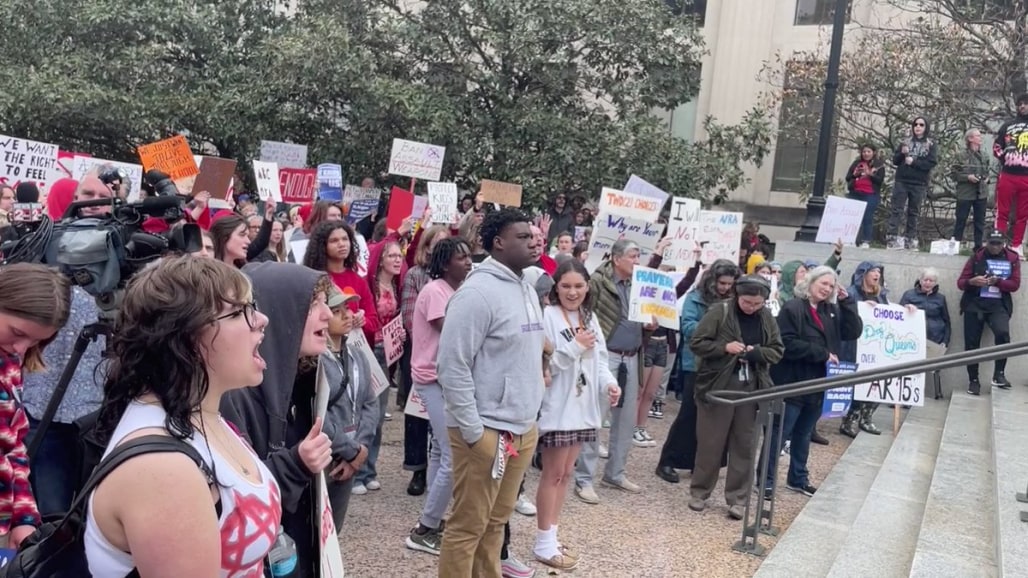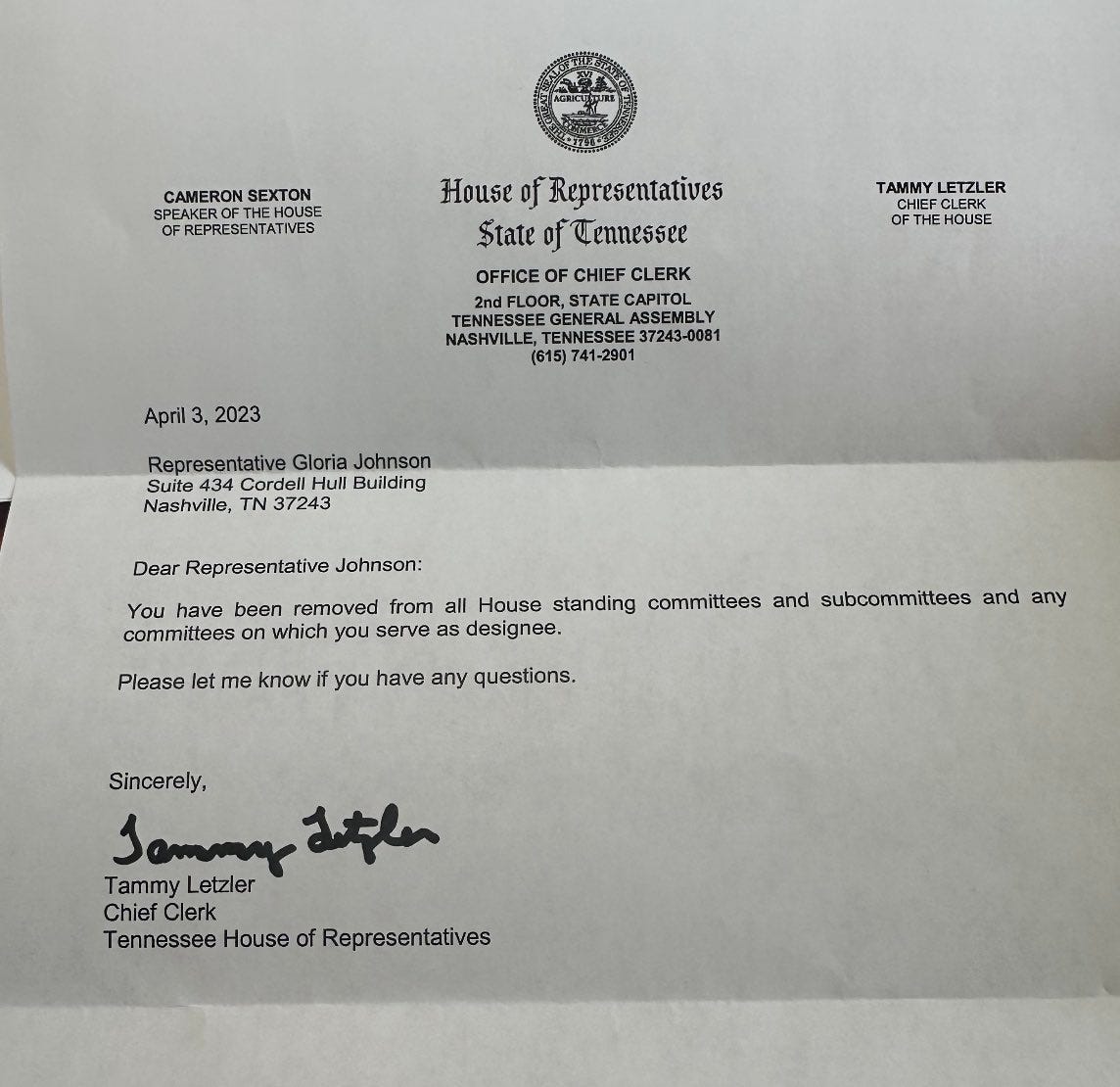Today’s spectacle was watching Donald Trump board his plane and prepare to fly back to New York to face the charges a grand jury voted to level against him. But it was private citizen Trump on the runway, waiting in line for other planes to take off ahead of his, a reminder that he is president no more and that beyond the Secret Service detail that will continue to protect him, he is no longer entitled to any special deference. He is private citizen Trump.
The real news today was the students of Nashville, Tennessee, who left their classrooms and peacefully protested gun violence in the wake of the shooting last week at Covenant School that left seven people, including the shooter, dead. They carried placards that said, “We demand action” and “Jesus wept,” and many of them marched to the state capitol. When they arrived, they demanded that their government protect them and prevent future school shootings. Estimates put the number of protesters at 7,000.

Students were joined by parents and other allies, including three Tennessee legislators. There was reporting that the Republican majority in Tennessee’s legislature responded by stripping the two Democratic representatives of their committee assignments and made a threat to expel three representatives.
The students are magnificent. I have been watching them all day, and they are still there as I’m writing tonight. They are what it means to be an American. Trump is a sad, disappointing contrast.
Tomorrow, we’ll learn what’s in the New York indictment—what crimes are charged, who is charged with them—when it is unsealed in advance of arraignment. The indictment must be unsealed before the hearing so it can be discussed in open court, but we don’t know exactly when that will happen tomorrow.
Most indictments are pretty bare-bones. They recite a minimum of information necessary to show that a defendant committed every element necessary to prove a crime; the actus reus (conduct), the mens rea (state of mind), and any attendant circumstances. The exception to the bare-bones indictment that we’re all familiar with from the past few years is the “speaking indictment” that tells more of the story of the crime. We often see that with conspiracy indictments, which leads to the interesting question of whether there will be a conspiracy charge in the mix when the indictment is unsealed tomorrow. But prosecutors will sometimes use a speaking indictment in a complicated case to put a little meat on the bones, which would make sense here. Shortly after the arraignment, Manhattan district attorney Alvin Bragg will hold a press conference.
Let’s indulge in a little speculation tonight and take a look at § 175.10 of the New York Penal Code: falsifying business records in the first degree. This is the crime that is widely expected to be in the indictment tomorrow. To obtain a conviction under the statute, the government must prove that a person has:
an intent to defraud
that includes the intent to commit another crime or to aid or conceal the commission of that other crime
and that they do one of the following:
make or cause a false entry in an enterprise’s business records
alter, erase, delete, etc., a correct entry in the records
omit to make a true entry in violation of a legal duty the person knows they have
prevent a true entry from being made or causing an omission
Those are the elements of the crime, and if it sounds like a lot of legalese, it is. I’ve drawn those elements from pattern jury instructions that are used in the state of New York. One way of figuring out what the government has to prove to get a conviction is to look at the statute itself. But statutes can be confusing, and courts may have interpreted them over time in ways that aren’t plain on their face. So I like to go to pattern jury instructions, which are a compilation of jury instructions that judges use when they instruct a jury on the law before the jury deliberates. I like to use the pattern jury instructions because they consist of the actual language judges read to juries to instruct them about what the government has to prove. In fact, when I teach criminal law to my first-year students, we often start our consideration of a new crime by reading the pattern jury instructions. It’s a very straightforward way of understanding what the government is required to prove.
The pattern jury instructions may not address all of the detailed questions that can come up about what must be proven. There are often issues that require careful reading of the jurisdiction’s case law. But they’re a very good start.
If violations of § 175.10 are included in the indictment, we now have a framework for understanding what the government must prove. They must show that Trump made or caused a false entry to be made in the Trump Organization’s books, with the intent to defraud, and with the intent to commit or conceal another crime. Legally speaking, the elements that are most likely to generate some contention will be what the other crime or crimes are (I’d expect more than one) and whether Trump had the necessary intent to defraud.
There’s a piece of disappointing news tonight. Last night, we discussed the request by news organizations to permit cameras in the courtroom during tomorrow’s arraignment. Tonight, the judge denied that request. He will permit five pool photographers to take photos for a few minutes before the arraignment starts, but no video or still photography will be permitted during the arraignment itself. Expect the news organizations to make a renewed request for future proceedings.
One final thought for tonight. Donald Trump has already begun to identify by name and threaten witnesses, prosecutors, family members, and judges in the criminal prosecution now underway against him in Manhattan. This is not surprising for him. Some of these people, witnesses like Michael Cohen, are familiar names. Others are not. Trump’s use of the ironically titled “truths” (like tweets) on his website to call these people out by name is reprehensible. I will not repeat their names, because that would further endanger them, but some of the language he uses could readily be interpreted by his followers as a call to action.
Nothing Trump does is shocking anymore. But it is literally unthinkable that a former president would put private citizens at risk. He knows his followers pay attention when he “truths.” The man who attacked Speaker Pelosi’s husband, Paul, leaving him seriously injured, said he acted because he thought Trump was being persecuted. In the trial of members of the Oath Keepers and Proud Boys in connection with January 6, and in other cases from that day, defendants and witnesses have said they came to Washington, D.C., and overran the Capitol because Trump wanted them to. With that background, Trump is on notice that he is intentionally putting these people at risk of violence. It is unconscionable.
The same is true of leaders in the Republican Party. Their failure to condemn what Trump is doing is equally reprehensible. They are on notice that any violence that takes place is their responsibility as well as his because they have tolerated his behavior, if not applauded it, for far too long. Trump is only concerned with himself, even when his behavior endangers others. But from tomorrow forward, a more responsible actor will have some authority to reign in Trump’s behavior. After tomorrow, Judge Juan Merchan in Manhattan will read the charges against Trump, he will take his plea, and he will set the conditions of his release. As we discussed last night, don’t expect an immediate gag order or a ruling that Trump may not post on social media, like the judge in charge of Roger Stone’s trial did. But do expect a watchful judge who will take steps to protect the integrity of the trial and the safety of jurors, witnesses, and people who work in the criminal justice system if necessary.
We’re in this together,
Joyce





First, I think once a president leaves office s/he loses all privileges given to a sitting President, that means no more SS. Second, did we adults really think that kids would continue to sit and do nothing while people keep coming to their schools and killing them? Bravo to these kids and hopefully more and more adults, ethical adults will join them. Third, I really think it is ridiculous the way the media is once again treating Trump. Inform us of what is happening media folks, but not every damn thing he utters or does? The 'does' is more important. We are all going to come out of this fascist period very soon and be better for it. I wait, with much hope for a Trump, indictment, trail and conviction in GA and with SP Smith.
Thank God for the children.